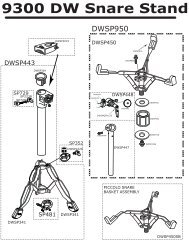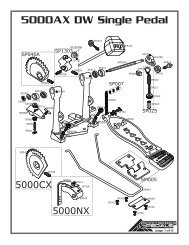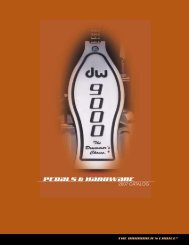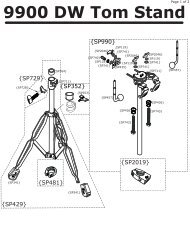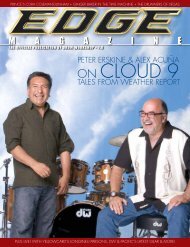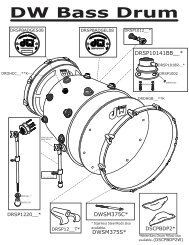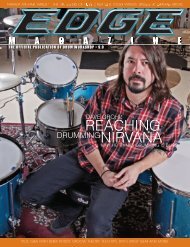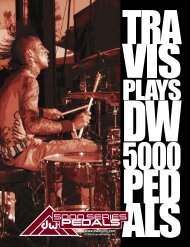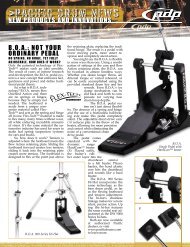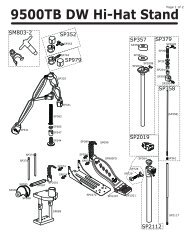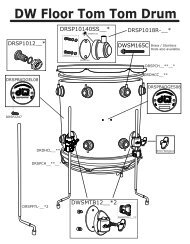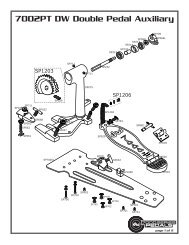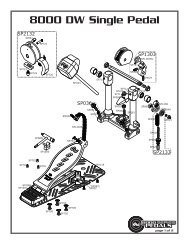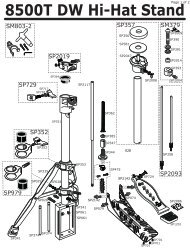You also want an ePaper? Increase the reach of your titles
YUMPU automatically turns print PDFs into web optimized ePapers that Google loves.
SATNAM RAMGOTRA ||| DW DRUMS<br />
SM A G A Z I N E<br />
SR: Music breaks down language barriers.<br />
That’s something that perhaps may be<br />
taken for granted by the masses. Music<br />
transcends everything, and at the heart<br />
of it is rhythm. I always wanted to play<br />
the drums. My dad was insistent upon<br />
me learning the tabla too. So, when I<br />
started snare drum and drum set back in<br />
5th grade in Canada, he taught me tabla<br />
simultaneously. Now, when I’m asked<br />
this very question, it’s hard to pinpoint.<br />
Western drummers say, “I totally hear your<br />
tabla influence in your drumming!” And<br />
the Indian Tabl-Ji’s (tabla players) all say,<br />
“I can really hear your drumming in your<br />
tabla playing!” For me, they’re one and<br />
the same, but I get how one can hear more<br />
drumming influence in the tabla playing.<br />
I do way more non-Indian gigs as a tabla<br />
player than I do Indian Classical gigs.<br />
Indian music by nature is much looser in<br />
terms of feel and swing. Playing in a band<br />
that doesn’t swing, but wants that ‘Indian’<br />
feel means you’ve got to know how to<br />
turn off that Indian swing and match the<br />
western ‘clave’ if you will. The first time<br />
I understood what Tabl-Ji’s meant by tabla<br />
influence in my drumming was back in<br />
Greece in 1997. I did a clinic at the Poly-<br />
Rhythmos School of Music in Athens. I did<br />
a little solo thing on the kit, what I call,<br />
“Look at me, look at me, look what I can<br />
do!” Then, I did a little solo thing on the<br />
tabla. The whole room, including myself,<br />
said, “Oh, I see!” Then the questions<br />
started to flow.<br />
SD: Would you say you have “chops”?<br />
SR: I went to PIT, and for about eight years<br />
after that, I’d say, “Yes.” By the way, during<br />
those eight years, I was broke, playing<br />
in an awesome power-trio band that<br />
unfortunately couldn’t break loose from<br />
the clubs. Anyway, now I’d say that chops<br />
don’t grab my interest as much as coming<br />
up with a new way to interpret 123-<br />
123-12 accents on 1. Going back to the<br />
previous question, that particular rhythm<br />
is the universal rhythm. It’s present in<br />
every single culture on our mother Earth!<br />
SD: Are you well-versed in many musical<br />
styles? Talk about your educational<br />
background.<br />
SR: “Well-versed” is a really subjective<br />
52<br />
S<br />
EDGE 10 ||| 2012-2013<br />
term. I get to play many different styles<br />
of music on both the drums and tabla.<br />
I’ve spent a year in Greece playing drums<br />
and tabla on traditional and hybrid Greek<br />
music and I also play with an assortment<br />
of Persian artists. I’ve been drumming on<br />
a legit Funk gig for years and I’ve played<br />
on Punk, Pop, Alternative, and Rock<br />
gigs in the past. That doesn’t necessarily<br />
make me well-versed in my book. Music<br />
explorations really started in my home.<br />
My mom sings and plays the harmonium,<br />
and my late father played the tabla; both<br />
were avid music fans. I’m the youngest<br />
of five children and all of us are extremely<br />
passionate about the music we listen to.<br />
Being the youngest, I was turned on to<br />
everything from 60’s and 70’s Rock, Disco,<br />
80’s New Wave, to hair bands, Punk,<br />
Hardcore, and Skate Rock! Combine<br />
that with Indian Classical, Light Classical,<br />
Indian film and Pop songs, Western<br />
Classical, Big Band Jazz, plus what I was<br />
learning in school, and that’s a pretty wide<br />
variety. Big Band is, incidentally, what<br />
really taught me how to play the drums.<br />
My elementary school band teacher<br />
would send me home with Fusion and Jazz<br />
records to check out Billy Cobham, Steve<br />
Gadd, Elvin Jones, etc. I was very lucky to<br />
have a basement in Canada that allowed<br />
me to practice for a gazillion hours a day.<br />
What I’m trying to communicate is that all<br />
of the music around me constantly taught<br />
me how to play. Practicing was just the<br />
vehicle to make it happen. Can you dig it?<br />
SD: How did you make the transition<br />
from session drumming to composing?<br />
SR: I didn’t know that I completely<br />
transitioned out of it. [Laughs]. It was<br />
more of a natural transition than a<br />
conscious transition. To stop playing or<br />
performing, those are thoughts that do not<br />
exist. In fact, I actually play more now.<br />
Since I play on everything I’m writing,<br />
and don’t just program it, I actually play<br />
the instruments analog-style. It gives<br />
me perspective. After years of always<br />
performing as a side man and always<br />
playing someone else’s parts, I’ve started<br />
looking at what gigs I really love doing,<br />
and which ones have become chores. I<br />
know that sounds a bit ungrateful, it’s not.<br />
It’s just the opposite. When you’re on a gig<br />
and you’re not happy, no one is benefiting.<br />
If it was just about a paycheck, we’d take<br />
jobs that don’t require a lot of passion, and<br />
we wouldn’t mind being bossed around. I<br />
discovered the idea of recording on movie<br />
dates as a soloist, but collaborating on<br />
people’s songs and working with producers<br />
is the most gratifying for me. On movie<br />
dates you might get handed a chart, but<br />
it’s a blank palette in terms of the level of<br />
creativity you want to bring to it. Most of<br />
the time, composers and producers send<br />
me their music and a click track and just<br />
say, “Can you make it better?” I realized<br />
that, in a way, this is sort of like composing.<br />
Then, more gigs started coming to me as<br />
a composer, where they would ask, “Can<br />
you just do a drum/percussion bed?” I<br />
quickly found out that’s actually harder<br />
for me. So, the first time I was presented<br />
with this scenario, I played a solo on my<br />
dulcimer, found a pattern I liked, and<br />
wrote a tune from that. It’s important to<br />
note that I don’t play the dulcimer, nor<br />
have I ever been trained on it, but it has a<br />
series of strings that aren’t rocket science<br />
to tune. It’s played with two thin mallets,<br />
otherwise known as hammers, which are<br />
very similar to playing with drumsticks.<br />
Then, I went back and layered in all of the<br />
drums and percussion. When I played it<br />
for them they loved it, and put in the film<br />
as is. Voila, I had my first additional music<br />
credit, although I don’t think I actually got<br />
a credit in the movie. About a month later,<br />
another composer asked me if I’d like to<br />
co-compose on a demo for the theme to<br />
Outsourced. At the time, it was a new<br />
NBC sitcom. Lo and behold, we got it!<br />
But I’m not composing full scores just yet,<br />
I’m mostly composing for music libraries,<br />
and it’s really fun.<br />
SD: What’s it like engineering your own<br />
drumming performances?<br />
SR: [Laughs] Some days it’s great, and some<br />
days it’s not so great. Sometimes you’re so<br />
‘in the pocket’ and other times, you want<br />
to be at the beach. I’m just kidding, a<br />
little. At first it was weird, but it’s been<br />
a great learning experience. I’m sort of<br />
old school, so I always want to attempt to<br />
deliver a solid take from beginning to end.



